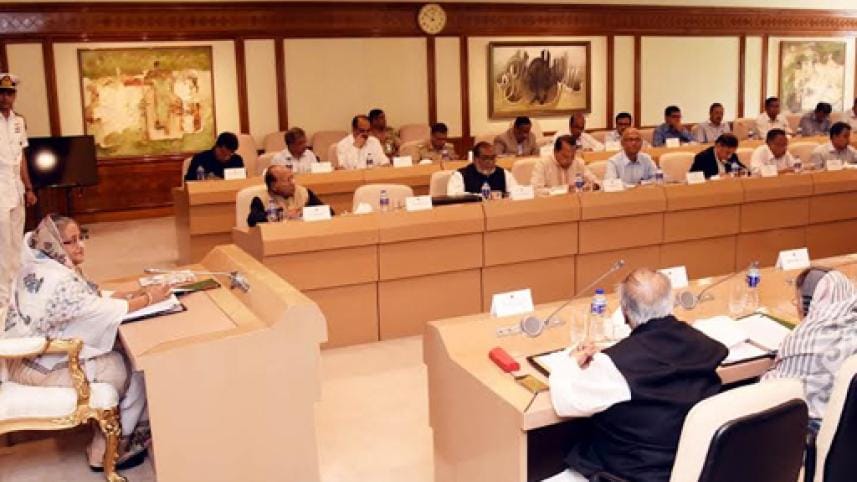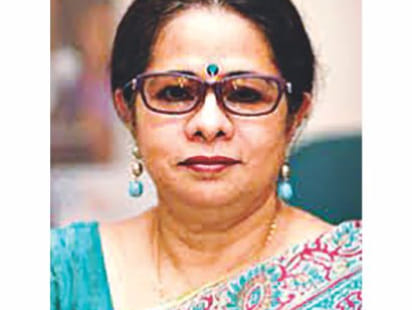Master's Status for Top Qawmi Degree: Towards legal recognition

The cabinet yesterday approved in principle the draft of a law framed to recognise top Qawmi degree Dawra-e-Hadith as equivalent to master's in Islamic studies and Arabic.
The proposed law will bring some 15 lakh Qawmi madrasa students under the mainstream education system, said Cabinet Secretary M Shafiul Alam.
A cabinet meeting, chaired by Prime Minister Sheikh Hasina at her office, gave the approval, he told reporters after the meeting.
On April 11 last year, the prime minister had announced that Dawra certificates would be recognised as equivalent to master's degrees. Two days later, the education ministry issued a circular to this end. Besides, it formed a committee led by Hefajat-e Islam chief Shah Ahmed Shafi, also the chairman of Befaqul Madarisil Arabia Bangladesh, to facilitate the recognition.
Talking to The Daily Star yesterday, those linked with Qawmi madrasas said students with Dawra degrees, the highest in Qawmi education, can now seek jobs meant for master's degree holders.
Educationists, however, expressed scepticism about the government move, arguing that it would create confusions as Qawmi and general educations are two completely different modes of education.
"The quality of their [Qawmi] education doesn't match with that of mainstream education. People will raise questions about the standard of the degrees in both formats. The degree in mainstream education has been undermined through this move," said Professor Emeritus of Dhaka University Serajul Islam Choudhury.
Noted academician Syed Manzoorul Islam, a former teacher of the university, said it appears to be a political decision rather than an academic one, as this comes ahead of the national elections.
However, Islamic thinker Maulana Farid Uddin Masoud thanked the prime minister for the cabinet approval, saying the matter would not have progressed this far without her interest.
"Through the honour and dignity that have now been given, the students of Qawmi madrasas will be able to get jobs," he said.
The country's madrasa system is divided into two categories -- Alia and Qawmi.
Alia madrasas, registered with and supervised by Bangladesh Madrasa Education Board, offer a distinctive combination of modern and religious education.
Qawmi madrasas, on the other hand, have so far been an uncharted territory with no government monitoring, supervision or support. They are run mostly with private donations.
There are about 14,000 Qawmi madrasas across the country, according to last year's report of Bangladesh Bureau of Educational Information and Statistics.
These madrasas operate under six boards with a common name -- Bangladesh Qawmi Madrasa Education Boards or Befaqul Madarisil Arabia Bangladesh. They are said to follow the syllabus of Darul Uloom Deoband, a historic Islamic school of India, focusing mostly on Arabic, Fikah (Islamic law), Tafsir (explanation of Quran), Hadith, and Persian and Urdu languages.
The Qawmi madrasas have six levels of education, starting from Ibtedaiyah (primary) to Dawra-e-Hadith.
THE PROPOSED LAW
The cabinet secretary said the proposed law was designed on the basis of a gazette notification the education ministry published on April 13 last year, recognising the Dawra-e-Hadith degree as equivalent to master's degree, reports UNB.
The bill, titled "Making Dawrae Hadith (Takmil) Certificate in Qawmi Madrasa Equivalent to Master's Degree (Islamic Studies and Arabic)", would have retrospective effect and those who have acquired Dawra-e-Hadith degrees after the recognition in April would be considered having master's degree, he said.
Shafiul said there would be a board named "Al-Haiyatul Ulia Lil-Jamiatil Qawmia Bangladesh" integrating the existing six Qawmi madrasa education boards.
The chairman of Befaqul Madarisil Arabia Bangladesh would be the ex-officio chairman of the 17-member integrated board. The board chairman can co-opt one or more persons as the members of the board, but the number of such members would not exceed 15, reported the news agency.
Shafiul said the board would prepare syllabus, question papers, conduct examinations, evaluate answer scripts, and award certificates among the students of Qawmi madrasas.
Besides, the status of the post graduate degree would be effective for the madrasas having registration with the board.
BACKGROUND
The issue of recognising Qawmi madrasa education first came to the fore during the tenure of the BNP-Jamaat government.
On August 21, 2006, just three months before leaving office, the then PM Khaleda Zia said the government decided to recognise Dawra certificates. However, the decision could not be implemented as the required process could not be completed.
But a section of Qawmi madrasa teachers and Islamic thinkers kept up the pressure.
In the face of their demand, the Awami League-led grand alliance government took an initiative to recognise Qawmi madrasas and reform their education system.
On April 15, 2012, the education ministry formed a 17-member commission comprised of Qawmi scholars, with Shah Ahmed Shafi in the chair, to improve Qawmi education and provide students with knowledge and skills needed for the job market. Maulana Masoud was made co-chair of the commission.
The commission on April 13, 2013, submitted a draft policy, outlining the curriculum, evaluation system and six tiers of Qawmi education.
It also proposed introducing certificates for each tier -- primary, junior secondary, SSC, HSC, honours and master's -- and a syllabus, including for Bangla, English, mathematics and social science, up to at least the higher secondary level.
Based on the draft policy, the ministry prepared a proposal to make a law and set up a body -- Qawmi Madrasa Education Authority -- with government representatives and experts in it.
The proposal was scheduled to be placed at a cabinet meeting on October 28, 2013, for approval.
But the ministry pulled the draft following threats from the Qawmi madrasa community, especially the Hefajat.
The Islamist group then started claiming that the government wanted to control the Qawmi madrasas in the name of the recognition.
The initiative was shelved then.
However, the ministry revived the plan. On September 27, 2016, it formed a committee headed by Maulana Masoud to find a way to recognise certificates of Qawmi madrasas.
But it faced opposition from Hefajat again. Then the government issued a circular reviving the commission led by Shafi. The body was asked to come up with ways to recognise the certificates.
In line with its suggestion, the then government proceeded to recognise the Qawmi madrasa certificates.
On March 28 last year, the education ministry had a discussion on the issue of recognising the certificates. At a meeting, ministry officials said the government would gradually start recognising Qawmi madrasa certificates from elementary level. But the madrasa authorities pressed that the government give recognition to their Dawra-e-Hadith certificate to help madrasa students get jobs.
Finally, the ministry accepted the proposals of the Qawmi madrasa authorities, backed by Chittagong-based group Hefajat.

SERAJUL ISLAM CHOUDHURY
Professor Emeritus Serajul Islam Choudhury has termed the government decision “unfortunate and harmful”.
"Qawmi madrasa education and general education should be kept separate. Mixing up the two will be harmful. It will create confusion among people as these are completely different. There is no similarity between the two," the eminent educationist told The Daily Star.
"The quality of their [Qawmi] education doesn't match with that of mainstream education. People will raise questions about the standard of the degrees in both formats. The degrees in mainstream education have been undermined through this move," he pointed out.

SYED MANZOORUL ISLAM
Noted academician Syed Manzoorul Islam said it appears to be a political decision rather than an academic one.
He mentioned that if this is an academic decision, the greater interest of students should be kept in mind.
Manzoorul, a former teacher at Dhaka University, said whenever he talked to madrasa students, he found them frustrated about getting jobs. But madrasa students also have the right to get proper education and lead an enlightened life.
"It seems the decision is not practical without a revision of the syllabus and curriculum. I think the government still has the option to revise those so that madrasa students can get better education and play a role in building the nation," he added.

RASHEDA K CHOUDHURY
Prominent educationist Rasheda K Choudhury said the government has the right to make any decision. But in this case, it needs to be looked into whether there is any equivalence between the two types of degrees.
"There are many streams in the existing mainstream education, and efforts are being made to reduce discrimination in it. But in the name of mainstreaming madrasa education, this type of wholesale recognition might create complexity in future."
Rasheda, also executive director of Campaign for Popular Education, said most of the Qawmi madrasas in the country have no approval. This means, the students, who pass from these unapproved madrasas, will also get a recognised degree which could add to complexity.
"Madrasa education is completely different. So I think government will explain under which consideration it has given the recognition," she added.

MAULANA FARID UDDIN MASOUD
"This is a historic day for Qawmi madrasa students, teachers and pious people," said Maulana Farid Uddin Masoud, an Islamic thinker.
He thanked the prime minister, saying this matter would not have progressed this far without her interest.
Farid Uddin further said that due to this decision, Qawmi madrasa students will now be able to get jobs.
Asked about the curriculum, Farid Uddin, also the imam of Sholakia Eidgah in Kishoreganj, said there is no need to update or improve the Dawra Hadith but curriculum and syllabus at lower levels of Qawmi education may need to be improved.
Maulana Nazmul Hasan
Jamia Madania Baridhara Madrasa Vice Principal Maulana Nazmul Hasan welcomed the move, calling it a “milestone” in Bangladesh's Qawmi madrasa education.
He also thanked the government for recognising Dawra-e-Hadith degree, the highest degree in Qawmi education.
“Our education system is already a well-recognised one. It has been recognised by the general people. You will see that 90 percent of our mosques, which are usually run by local communities, have imams and khatibs with a Qawmi background. This suggests its high level of acceptance among people. But we lacked official recognition, which we have got now.
“Having official recognition is a matter of practical necessity. This decision, when it comes into effect, will open up a lot of doors for our graduates. If I understand correctly, they can now apply for government jobs, and other initiatives and programmes where having a government-approved certificate is a precondition.
“Earlier, we couldn't work at public mosques because our certificates were not recognised. But now we can,” he added.



 For all latest news, follow The Daily Star's Google News channel.
For all latest news, follow The Daily Star's Google News channel.
Comments